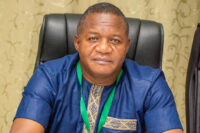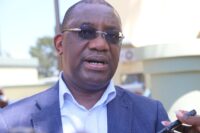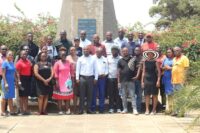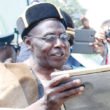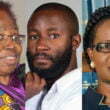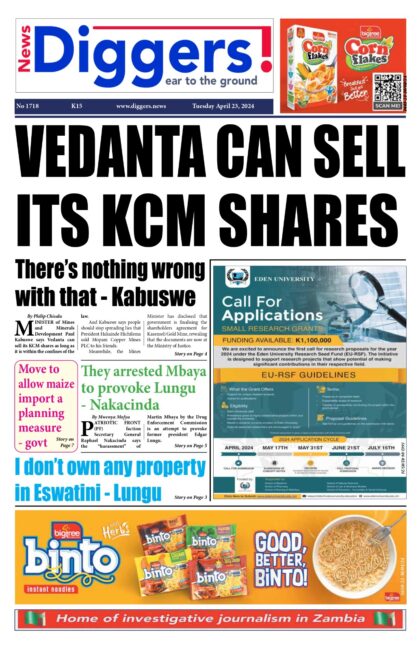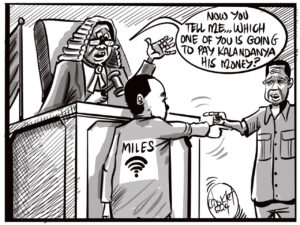Solicitor General Abraham Mwansa has insisted that the High Court should wholly dismiss the UPND Presidential petition on the right to be heard, saying it’s a waste of the court’s time because the lower court has no powers to direct the Constitutional Court to rehear the case.
But UPND lawyer John Sangwa has insisted that in dismissing the petition without hearing it, the Constitutional Court violated Article 18(9) of the Constitution, adding that hearing of the petition was not fair, and that the time given was unreasonable.
The court will, however, deliver its ruling later this month.
This is in a case in which UPND leader Hakainde Hichilema and his vice-president Geoffrey Bwalya Mwamba have asked the High Court to determine whether their right to be heard in a Presidential election petition was violated when the Constitutional Court dismissed it on September 5, 2016, for want of prosecution.
When the matter came up before High Court Judge Mwila Chitabo, Monday, Sangwa maintained that the petitioners’ right to a fair hearing was violated by the Constitutional Court.
He recounted the 2016 happenings where the court had directed the parties that trial would commence on September 2, that year, and conclude on September 8, but had ended up vacating that decision when they ordered that trial would commence on September 2 and end on the same day.
“This what transpired; the Constitutional Court directed the parties to file bundles of documents and records of proceedings by September 1, 2016. The directions were that we will start on September 2, which was a Friday and conclude on Thursday, September 8, 2016. The court gave the directions that as long as we start within the 14 days, it’s okay. On August 31, the petitioners and respondents appeared before the single judge of the Constitutional Court. But unknown to the petitioners, the respondents’ advocates had filed submissions telling the court that you must conclude the case by September 2, 2016, and any hearing after September 2, will be a violation of the Constitution,” Sangwa narrated.
“We trusted the Constitutional Court; we believed the directions that were being given. We have been long at the bar. There’s no way we would have been careless in the manner that has been suggested. On September 1, the single judge directed that trial should commence and conclude on Friday, September 2, 2016. The earlier direction was vacated without any input from the petitioner’s advocates. How could it be humanely possible to conduct a case of this matter, with well over 2,000 pages documentary evidence, to start and conclude a case like this in 24 hours?”
He said the Constitutional Court then delivered a ruling in which they reversed their own directions and dismissed the petition for want of prosecution.
“September 2, after deliberation by the Constitutional Court, the court ruled that they will adjourn the petition to Monday, September 5, and that the petitioners will have two days in which to present their case and the respondents will also have two days. This was around midnight. On Monday, the Constitutional Court went on to deliver a ruling in which the three judges, who formed the majority, reversed its own directions and dismissed the petition for want of prosecution without affording the petitioners the opportunity to be heard,” he argued.
Sangwa said the petition hearing was not fair and the time which was given, although set by the Constitution, was not reasonable.
“It is important to note that [the] Constitution gives a right to any person in Zambia to challenge the outcome of the Presidential election. It is a civil right. The parties must be given a fair hearing and it should be undertaken within a reasonable time. In this case, the process was not fair and the time given, though set by the Constitution, was not reasonable. Whether one has been validly elected or not, the Constitutional Court must be independent and impartial,” he said.
Sangwa submitted that in dismissing the petition without hearing it, the Constitutional Court violated Article 18(9).
“Since the State is defending what the Constitutional Court did, the burden will be upon them to prove to this court that in dismissing the case without hearing it, the Constitutional Court was in line with Article 18(9). In this case, we are not making allegations, we are categorically stating that the Constitutional Court violated Article 18(9) of the Constitution,” he added.
Sangwa further asked the court to resolve whether it was fair to give the petitioners four hours to prosecute their case.
And in his submissions, Solicitor General Abraham Mwansa argued that the Constitutional Court had the power to interpret all provisions of the Constitution inclusive of the Bill of Rights.
He submitted that the Constitutional Court was properly served with the jurisdiction to interpret that the petitioner’s petition could only be heard within the period of 14 days.
“Therefore, a judgement of the Constitutional Court arising out of the interpretation of the provisions of Article 101(5) cannot be assailed and termed a violation of the right to be heard as provided for Article 18(9) of the Constitution. We submit that this court has no jurisdiction to reveal the judgement of the Constitutional Court on the interpretation of article 101(1),” he said.
“Mr Sangwa submitted that Article 18(9) of the Constitution provides that any matter ought to be heard within a reasonable time, we submit that it is very clear, and it is in black and white that, the hearing of the Presidential election petition, particularly on the right to be heard within a reasonable time, cannot be subjected to the provisions of Article 18(9) of the Constitution. We say so because Article 101(4) and the provisions of Article 103(1) clearly provides for a period within which a Presidential election petition maybe heard.”
He further argued that the High Court had no powers to direct the Constitutional Court to rehear the Presidential election petition, which judgement was not appealable.
He urged the court to dismiss the petition in its entirety, insisting it was a waste of the court’s time.
“We pray to this court that we may be granted the motion to have the petitioner’s petition dismissed in its entirety as it is misconceived at law and lacks law merit. This is not a petition that should have been brought before this court. It is a waste of the court’s time,” said Mwansa.
Ruling has been reserved to Friday, November 23, 2018.




